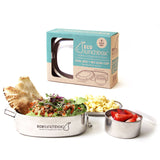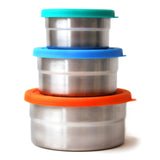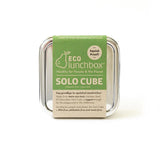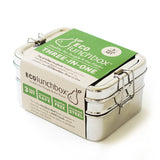Ozbabybargain is the ultimate online discount baby shop founded by mums and created for mums who want great quality baby products at bargain prices. We understand that...
Shop by Category
Shop by Brand

Ecolunchbox
Why ECOlunchbox? Why was ECOlunchbox founded? ECOlunchbox was started by eco mom Sandra Ann Harris, who lives in Lafayette, Calif. with her husband and two school-age children. Sandra wanted to make available lunchware for families that would help them reduce their dependence on plastics for health and environmental benefits. Plastic is a petroleum-based material that leaches chemicals in our food, our bodies and the environment. What kind of stainless steel do you use? All of the stainless steel used in our lunchboxes and snack containers is high quality, food safe, corrosion resistant and independently tested. Our ECOlunchbox Oval and yogurt cup and the Blue Water Bento collection with non-toxic 100% silicone lids are made in China of high-quality, food-grade 304 stainless steel. All other ECOlunchbox stainless steel bentos are made in India with high-quality, food-grade stainless steel 201. What kind of silicone do you use in your Blue Water Bento collection? Our Blue Water Bento collection uses a pure food-grade silicone that meets FDA and NSF testing requirements. The non-toxic, plastic-free material has multiple upsides for users. Here's why we love our silicone! It's non-stick, flexible and easy to clean, and doesn't dry out and crack with use! Our silicone lids are dishwasher safe and oven safe up to 400 degrees Fahrenheit (204 degrees Celcius). The silicone lids are also freezer safe, but beware because it's risky to freeze in our steel containers. Liquids swell when frozen and if the steel container is overfilled the freezing will split the steel. Why are silicone lids better than plastic? From a human and environmental health perspective, we believe that silicone is currently the best material available for snap-on, leak-proof food container lids because it's long-lasting and free of estrogen-mimicking chemicals commonly found in plastics, like bisphenol-A (BPA). Silicone is a synthetic polymer made from the Earth's element silicon, which is the second most abundant element in the earth's crust and makes up about 27% of the average rock. When mixed with oxygen, silicon becomes silica and is present in nature as sand and quartz that are commonly used in making glass. Non-toxic and rubber-like, the silicone material used in our products is much more durable and longer lasting than plastic and it does not contain petroleum. Silicone resists degradation resulting from prolonged use as well as exposure to extreme temperatures and can safely be put in the dishwasher or the oven. Although silicone is not biodegradeable, scientists believe the material is not hazardous to the environment nor toxic to aquatic or soil organisms-
ECOlunchbox Oval
$39.95
$44.95You save: 11%
View
-
Ecolunchbox Seal Cup Trio
$39.95
$46.95You save: 14%
View
-
ECOlunchbox Solo Cube
$24.95
$29.95You save: 16%
View
-
ECOlunchbox Three-In-One
$39.95
$49.95You save: 20%
View






